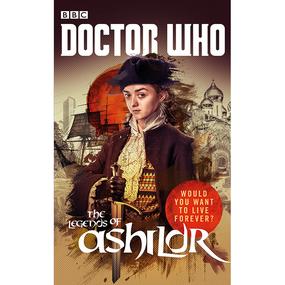Review: Doctor Who: Books: The Legends of Ashildr
By James Goss, David Llewellyn, Jenny Colgan & Justin Richards BBC Books, out now How The Girl Who Died became The Woman Who Lived… Quick to capitalise on the popularity […]
By James Goss, David Llewellyn, Jenny Colgan & Justin Richards BBC Books, out now How The Girl Who Died became The Woman Who Lived… Quick to capitalise on the popularity […]
 By James Goss, David Llewellyn, Jenny Colgan & Justin Richards
By James Goss, David Llewellyn, Jenny Colgan & Justin Richards
BBC Books, out now
How The Girl Who Died became The Woman Who Lived…
Quick to capitalise on the popularity of Maisie Williams’ character in this season of Doctor Who, BBC Books has produced this volume of four short stories featuring Ashildr as she progresses from the maiden in the Viking village to the highwayman the Doctor meets in the mid-17th century. They’re each very different in tone and format and all work well on their own terms.
The book kicks off with James Goss’s tale of Ashildr’s encounters with mythical creatures, followed by David Llewellyn’s piratical story. Jenny Colgan’s contribution is taken from Ashildr’s journals, and chronicles one of the hardest times in her life – and the only one glimpsed in The Woman Who Lived. Justin Richards provides a Dark Tower for Ashildr to enter, facing her own demons along the way.
Goss takes the Legends part of the title to heart, presenting the story in a narrative form borrowed from the Arabian Knights, set at a time when Ashildr is still, to an extent, enjoying her immortality. Llewellyn ramps up the SF level of the story with a very sharp left turn midway through that demonstrates how different Ashildr is from other time travellers and immortals we’ve met along the way.
Colgan’s story is up there with Joanne Harris’ Third Doctor Time Trip The Loneliness of the Long Distance Time Traveller and Matt Jones’ The Nine-Day Queen (from the mid-90s Decalog collection), in terms of its depiction of heartrending emotions. We knew Ashildr lost her children in the plague; now we go through it with her. As with those other two stories, you may well find there’s something in your eye by the end – and if I had to choose one of the four, this is the one I’d like to hear Williams read. The collection ends with a shorter story from Richards that ties together some of the themes from the preceding three tales as well as showing us an Ashildr whose harder crust is now accreting around her as a result.
Verdict: A short but highly effective collection. 9/10
Paul Simpson